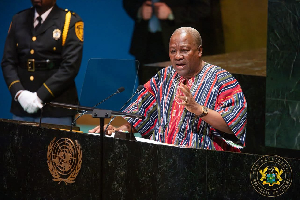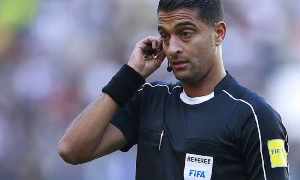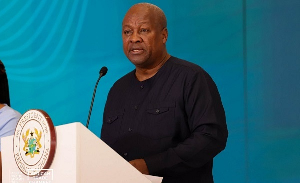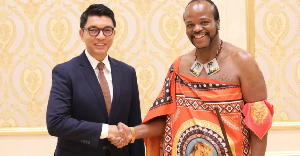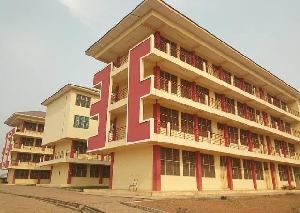Humility, sincerity, levelheadedness, love for our fellow Ghanaian, unity and resolve to focally work for the common good of our country are crucial for our survival, both as a nation and in our drive to be a progressive country.
For years, some of us have been debating on the propriety of being participants on the Ghanaweb. The frequent negativity in rhetorical effusions by many of our country folks held many of us out until one article rammed home to me that if falsehood and propagation of hatred are left uncorrected, the truth and harmony become the irredeemable casualty. However, after my brief appearance, I recoiled and stayed away again because of the continuing negativity. I am sure many other Ghanaians that might like to participate in discussions on this forum are likewise deterred because of these behavioral tendencies. I am also sure that many of us who perpetuate the negativity are aware that such rhetorical effusions do not help and yet, we continue to do so just to offend others. Day in and day out, supporters of our two major parties trade fierce attacks with each other. Some of these attacks, riddled with insults, name calling, tribal and ethnic hatred, and, threats of violence, rob us of the focus, amity, and quintessential teamwork needed for country building. Lately, the negativity has degenerated into intra-party feuds. The myriad consequences of these are unspeakable. They distract our leaders from focusing on their work, put us in a negative lights to the outside world, deter influx of foreign investment and tourism, and deprive us of the goodwill that Ghanaians normally enjoy everywhere in the world. It just simply is not good for us to continue behaving so counterproductively.
The latest reverberation of our negativity is evident from the daily discussions on Mabey and Johnson corruption case. The destabilizing revelations of that case are bad enough and must be tackled head on. But it is extremely retrogressive when, instead of focusing on the problem itself and taking the necessary measures to sanction the culprits and deter, if not entirely eradicate, such tendencies in the future, we permit ourselves to be swayed into politicizing the issue and, again, propagating needless tribal hatred to derail or confuse the Government’s mandate to act. Fellow Ghanaians, do we need these? Nor are we naturally as bad as we have been presenting ourselves by this unbecoming feud to the public gaze. I will tell you, I have been to many places where all I hear have been praises of Ghanaians for their civility and unique hospitality. Let’s nourish these fondly-held perceptions and focus on loving and working together as one people, instead of the unnecessary bickering and hatefulness we have been exhibiting because, while the former are solid posts on which we can build unwaveringly, the latter would only destroy us. We should always remember that we are not the only people who read our articles and that they are read all over the world. Do we want to be seen as people who, instead of striving to move forward with inventions and productivity as worthy participants in the global economy, only take delight in hatefulness and how to pull one another down? While the purpose of this article is to share thoughts on fashioning our system to reduce, if not totally forestall, a recurrence of the Mabey and Johnson situation, we should be clear that this piece is by buy no means an endeavor to stifle or chill freedom of expression. Freedom of expression, no matter how twisted, is an inalienable human right and must be cherished, exercised, and enjoyed by everyone of us equally. Indeed, although there are settled constitutional limits to free speech, forbidding defamation, obscenity, deceptive advertisement, and fighting words that evoke imminent lawlessness, the fundamental right to speak includes the right to disagree, criticize, dispute, or even dislike one another. In our present context, speech, even where extremely critical, is healthy if it is constructive and devoid of any destructive undertones. While we can thus have inter-party or intra-party criticisms that are constructive in nature, it is imperative that we restrain ourselves from crossing the line to criticize destructively. Ideally, civility will require that people, in the first instance, criticize their party members through the party system, rather than bringing their criticisms to the open. While this protocol might apply to intra-party criticisms, all criticisms, whether intra- or inter-party, should civilly eschew propagation of inter-tribal and ethnic hatred, threats of violence, and blatant mongering of falsehood. Many of our daily comments on the web are replete with these offensive effusions and must be stopped, at least for the betterment of our country. As previously noted, apart from the fact that they stall progress, they can foment unmanageable and unintended violent confrontations; deter foreign investments, tourism, and progress; and, at times, compromise our cherished and well-deserved enviable good name and goodwill as Ghanaians. Please let’s be mutually civil and professional to one another and, together, work harmoniously for the common good of our nation. We are being watched all over the world, at least one criterion used in ascertaining our stability and clemency in determining whether to visit us or invest in our country.
Now back to M. & J. That the Mabey and Johnson case reflects a common practice all over the world is a fact beyond debate. Public projects are normally awarded to contractors and subcontractors. In so doing, the overseers sometimes engage in the M & J-type conduct by impermissibly hoisting favoritism, nepotism and kickbacks. To combat these corrupt practices, there are many types of laws designed to ensure that contracts are awarded solely to the lowest bidder that is the most qualified to do the work cost-effectively. One of these is the “competitive bidding law,” and it is believed that Ghana would greatly benefit from adopting it as a model to refine what is currently in place. Some salient features worth-considering are as follows:
1. Whenever a public agency decides to contract for goods or services, the agency must detail the reasons for its decision, indicating that the goods or services are necessary and cost effective and in no way detrimental to public policy.
2. Prepare a "request for proposal" (RFP) document, providing a detailed description of the goods or services, including all programs and preliminary design requirements, as the case may be. Ideally, the technical specifications should be prepared by a qualified design professional that can help ensure that the proposal meets the agency’s technical requirements. In addition, the RFP should contain objective criteria that would be used in evaluating and rating the proposals. This should include the proposer’s past performance on similar projects, if this is not the first time he/she is performing such services, and s/he must provide a copy of any certificate evidencing his /her qualification to do the work. Moreover, the RFP must specify that any bidder later detected to have won a bid by corruption, nepotism, or illicit influence would be severely punished, including but not limited to, a surcharge of 10% of the total contract price. [The laws of Ghana should have an independent provision for punishing officials who tamper with the bidding laws].
3. The soliciting public agency must publish its RFP at least once in the Central Register of the procurement office and in two major Ghanaian newspapers not less than two weeks prior to the proposal deadline. In addition, the agency must post the advertisement in its offices at least two weeks prior to the deadline, state when and where the RFP can be obtained, the deadline and place of submission of proposals, and time and date for opening of the proposals. [If bidders are needed from overseas, the appropriate newspapers and the internet should be used]
4. The agency must make the RFP available on equal basis to anyone who requests a copy. In addition, it should keep record of all vendors who receive the RFP.
5 The agency should: a) Choose from qualified design professionals one or more individuals to evaluate the proposals. b) Document dates and times proposals are received. Any corrections made to a proposal after receipt of that proposal (but before the deadline) must be received as sealed packages. No proposal should be accepted if it comes in later than the deadline. c) Keep proposals confidential until the evaluation process is complete. At the time the proposals are opened, the agency must make available for public inspection the register of proposals, detailing name of each proposer. d) After opening the proposals, the evaluators should examine each to determine whether it is responsive to all the RFP requirements. A proposal that does not meet any of the requirements should be rejected.
6. Once rejections have been made, the accepted proposals would be evaluated by: * Assigning each proposal a rating of "highly advantageous", "advantageous", "not advantageous", or "unacceptable" for each evaluation criterion and the reasons for each rating. *Assigning each proposal a composite rating and the reasons therefor. *Verifying whether the services or goods are or would be manufactured within Ghana. The ratings should be expressed in qualitative terms inspired by the evaluators’ qualitative judgments. *Assign an overall rating to each proposal and explain in writing the reasons for their composite rating of each proposal.
7. Evaluation of the price proposals. The reasons should reflect the relative importance of the evaluation criteria. a) The price proposals should be evaluated, following the method specified in the RFP. The evaluation would first determine whether each price proposal meets the submission requirements. b) The most advantageous offer should be identified, taking into consideration the proposal and price evaluations. Typically, the lowest priced proposals would receive the highest overall rating. Corollary, if all proposals receive same rating and differences are insignificant, the lowest-priced proposal should be selected. At times, a judgment call might be required where one proposal is rated "highly advantageous" but with a higher price than the lowest-priced proposal that is rated "advantageous". The judgment call should be based on whether the benefits afforded by the highly advantageous proposal may or may not be worth the cost premium that would be incurred by selecting that proposal.
8. Award the contract. The agency must give written notice of the award decision to the selected proposer within the time for acceptance specified in the RFP. If the agency does not award the contract to the offeror who submitted the lowest proposal, it must explain the reasons for the award in writing and retain this written explanation in its files for at least ten years from the date of final payment under the contract.
The name of the firm awarded the contract should be published in the Central Register.
Finally, and again, let’s put all negative and divisive tendencies behind and work constructively and harmoniously to modernize our country and improve the standards of living for all.
By Dr. Nii Out Quaye
Opinions of Tuesday, 13 October 2009
Columnist: Quaye, Nii Otu
Let’s Take Off The Gloves And Work Together For The Common Good!
Entertainment
